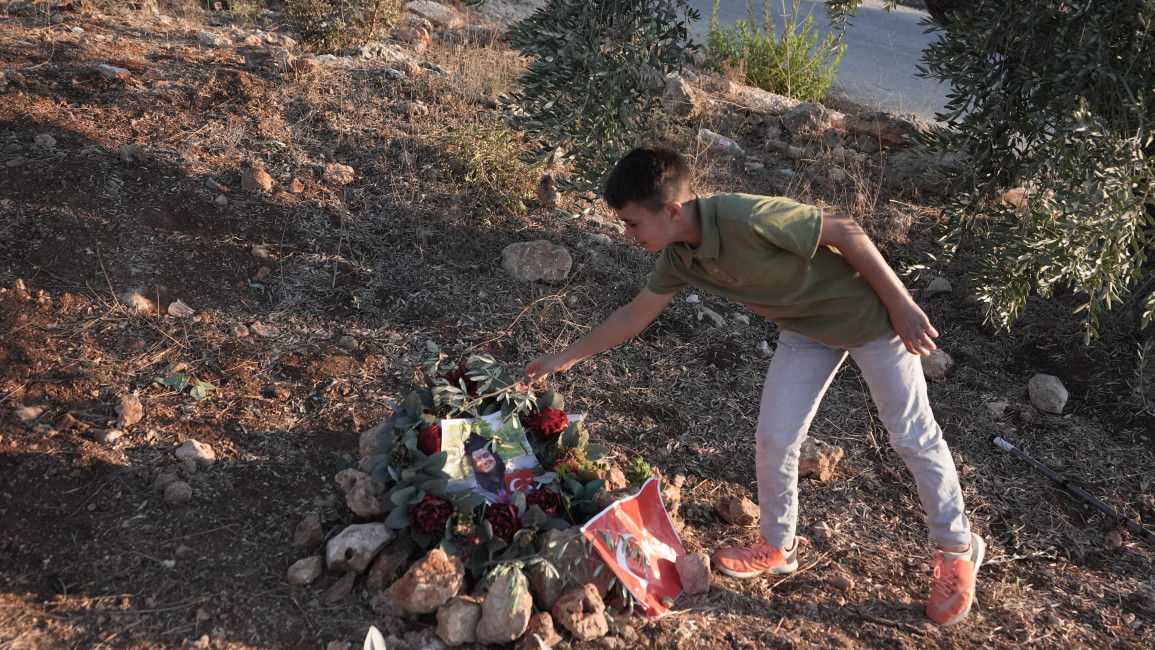US-Turkish activist was shot by Israeli fire after West Bank protest ended: report
The US-Turkish activist fatally shot in the occupied West Bank last week was hit by Israeli army gunfire from more than 200 meters away after the protest had ended, according to an investigation, contradicting an official Israel military account.
Aysenur Eygi was shot in the head by Israeli troops after she had taken cover in an olive grove some 200 meters away from the centre of the protest, an investigation by US newspaper The Washington Post published on Wednesday found.
Egyi was participating in a weekly peaceful demonstration in Beita, a village in the West Bank, as a volunteer with the International Solidarity Movement, to support local Palestinians who had faced encroachments from the illegally constructed settlement outpost of Evyatar.
US President Joe Biden on Wednesday said he was "outraged" by Egyi's death and cited Israel's preliminary investigation into the shooting which concluded that it was a "tragic error resulting from an unnecessary escalation".
The president's remarks followed Secretary of State Antony Blinken who said Israel's military conduct in the West Bank must be reviewed, while the Israeli army said on Monday that it was "highly likely" they killed Eygi.
In a harder line than the Americans, Turkey said on Thursday that it had opened an investigation into Eygi's killing and would take the case to the United Nations. Eygi's family is waiting in Turkey for her body to arrive for burial.
The 26-year-old is the second American citizen to be hit by Israeli gunfire in the West Bank in less than two months, after activist Daniel Santiago from New Jersey was shot in the leg in the same olive grove where Eygi was killed, according to the report.
The Evyatar outpost, some 48 kilometres north of Ramallah, was legalised by the Israeli government in June, despite it contravening international law. The number of these outposts has surged in recent years, according to a recent BBC investigation found at least 196 outposts established across the West Bank.
The Washington Post interviewed 13 eyewitnesses and Beita residents and reviewed more than 50 photos and videos of the incident.
One of those interviewed was an Australian woman in her 60s called Helen, who was next to Eygi when she was shot.
Helen was also volunteering for the first time that day and told the paper how she and Eygi had discussed before the demonstration how they would "not want to be near any action at all" and were cautious of the Israeli army's presence.
When a confrontation between Palestinians, who had just finished their Friday prayer service, and Israeli soldiers broke out, Helen and other international activists moved away from the commotion some 200 metres down the road to wait it out in an olive grove.
Israeli forces were using tear gas to disperse the crowd and then "resorted almost immediately to live ammunition", residents, and activists said.
Eygi and Helen were waiting by an olive tree when "two shots" rang out, thought to be from a group of four soldiers who were positioned on top of the roof of a Palestinian man’s home up the hill.
Jonathan Pollak, an Israeli activist, and writer, who regularly attends the demonstrations at Beita and was stood some 25 metres across the road from the two women said he saw a soldier "training his gun in our direction".
Pollak was interviewed by CNN in the wake of Eygi’s death and said that the Israeli military often used live ammunition during the protests, and did so with impunity.
Eygi was hit by a shot to the left side of her head and was pronounced dead some 40 minutes later at Rafida Hospital in Nablus.
Human rights groups have repeatedly found extensive use of force by Israeli soldiers against unarmed civilians in the West Bank.
Breaking the Silence, an Israeli NGO of former soldiers and whistleblowers have said that soldiers are given the broad command to open fire, including firing at protesters' legs as a deterrent.
The Palestinian health ministry said that some 703 people had been killed, including 159 children, by Israeli soldiers or settlers since 7 October.
Violence has flared in the West Bank following the Hamas attacks on southern Israel and the outbreak of war in Gaza. Palestinians have faced near-weekly raids by Israeli forces which erupt into hours-long battles with Palestinian militant groups in towns including Jenin, Tubas, and Tulkarm.
In addition, ultra-nationalist Jewish settler groups have been emboldened under the command of National Security Minister Itamar Ben-Gvir and Finance Minister Bezalel Smotrich, both settlers.
Smotrich introduced measures in June to cement Israeli control in more areas of the West Bank while Ben-Gvir has previously said that the rights of Israelis are more important than "freedom of movement for the Arabs".







 Follow the Middle East's top stories in English at The New Arab on Google News
Follow the Middle East's top stories in English at The New Arab on Google News
![The new film casts Israeli actors to tell the story of Mary while leaving out Palestinians [Getty]](/sites/default/files/styles/image_330x185/public/2024-11/GettyImages-2172155541.jpg?h=199d8c1f&itok=wJWyXDEQ)
![Ben & Jerry's has taken Unilever to court for its alleged attempts to silence it [Getty]](/sites/default/files/styles/image_330x185/public/2024-11/GettyImages-2183900214.jpg?h=199d8c1f&itok=jEcYtQ64)
